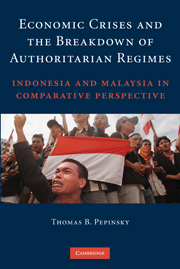 Economic Crises and the Breakdown of Authoritarian Regimes
Economic Crises and the Breakdown of Authoritarian Regimes Published online by Cambridge University Press: 21 January 2010
In Chapter 2 of this book, I noted that the twin crises in Indonesia and Malaysia are examples of a phenomenon that has become common as emerging market economies have opened their borders to capital flows and privatized their financial sectors. Nothing in my theory, however, is specific to Southeast Asia during the Asian Financial Crisis. Can this theory help us to make sense of financial crises, economic adjustment, and regime survival elsewhere in the world?
In this chapter, I show that it can. My theory uncovers two fundamental regularities in the politics of twin crises. First, coalitional politics determines adjustment policy. By taking seriously the preferences of supporters of autocratic regimes across the world, we can understand adjustment policies in a wide range of authoritarian regimes. Second, preferences for adjustment are at the heart of political conflict over autocratic regime survival. I demonstrate empirically that regimes that impose capital account restrictions during twin crises are more likely to survive these crises than regimes that do not. This finding holds up across countries and when controlling for alternative explanations for regime breakdown. These findings each lend crucial support to the theory that I derived from the experiences of Indonesia and Malaysia, and they reassure us that their experiences are indicative of a larger trend across the world, one that until now has escaped the notice of political scientists.
The methodology employed in this chapter differs from that used elsewhere in this book. Here, I focus on large-n quantitative analyses complemented by briefer case studies.
To save this book to your Kindle, first ensure no-reply@cambridge.org is added to your Approved Personal Document E-mail List under your Personal Document Settings on the Manage Your Content and Devices page of your Amazon account. Then enter the ‘name’ part of your Kindle email address below. Find out more about saving to your Kindle.
Note you can select to save to either the @free.kindle.com or @kindle.com variations. ‘@free.kindle.com’ emails are free but can only be saved to your device when it is connected to wi-fi. ‘@kindle.com’ emails can be delivered even when you are not connected to wi-fi, but note that service fees apply.
Find out more about the Kindle Personal Document Service.
To save content items to your account, please confirm that you agree to abide by our usage policies. If this is the first time you use this feature, you will be asked to authorise Cambridge Core to connect with your account. Find out more about saving content to Dropbox.
To save content items to your account, please confirm that you agree to abide by our usage policies. If this is the first time you use this feature, you will be asked to authorise Cambridge Core to connect with your account. Find out more about saving content to Google Drive.